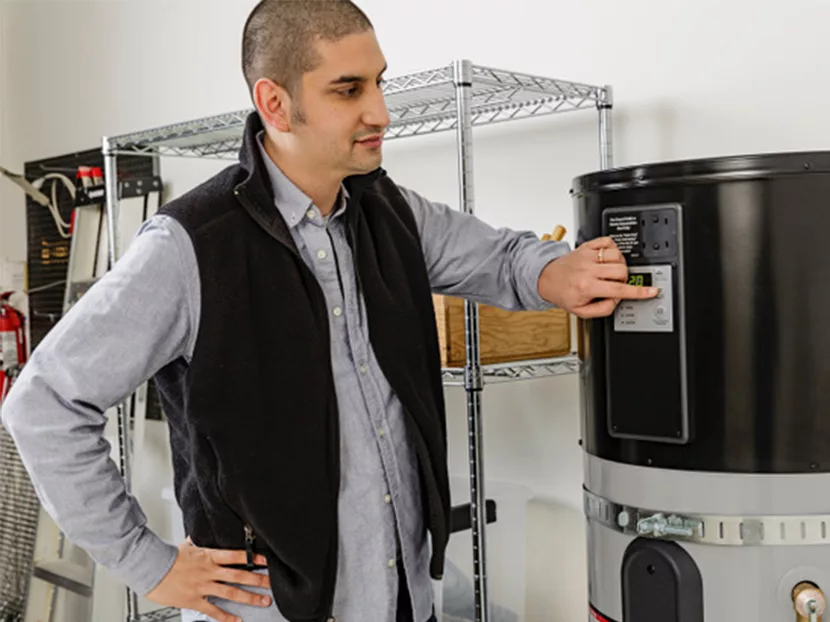Spurred by research from some of the nation’s leading energy-efficiency alliances, homeowners and contractors are showing renewed interest in hybrid electric heat pump water heaters.
One of the groups leading the charge to raise awareness for these products is the Northwest Energy Efficiency Alliance (NEEA), an alliance of more than 140 Northwest utilities, including Portland General Electric and Puget Sound Energy. NEEA’s website features an entertaining video comparing a standard water heater to a pair of scissors cutting a front lawn, while a heat pump water heater performs like a lawnmower. The website lets consumers know that a heat pump water heater can save them up to 60 percent in annual water heating bills, a quantum leap in efficiency over standard electric water heaters.
“Roughly 50 percent of all the homes in the U.S. have electric water heaters, and, in the average home, heating water accounts for about 18 percent of the total energy bill,” says Geoff Wickes, senior product manager for emerging technologies for NEEA. “Heat pump water heaters use just 30 percent of the energy of standard electric water heaters.”
Those savings, roughly $250 to $450 per year, per household, are usually enough to start the conversation with most consumers. Still, many contractors may be unaware of how heat pump water heater technology has improved over the last decade.
“The technology has matured significantly, and manufacturers are making very reliable products that offer a 10-year warranty,” Wickes adds. “This gives the homeowner the peace of mind and security that they’ll have significant savings, a reliable product, and no interruption of hot water. Plumbers should lead with the heat pump water heater solution if it’s the right application. A heat pump water heater creates a win for both the customer, who saves money, and the contractor, who will enjoy higher profit margins and more word-of-mouth referrals from happy customers.”
NEEA estimates that heat pump water heaters could save the Northwest region 289 annual megawatts by 2035 — enough to provide hot water for more than 200,000 homes each year.
Some areas are prime candidates
Heat pump water heaters work well in almost every region of the U.S., but phenomenally well in warm, moist climates. For example, in a Florida garage installation, a heat pump water heater runs just a fraction of the time each day (45 minutes to 90 minutes) compared with a garage installation in the Pacific Northwest, where it runs 3 to 5 hours.
“This technology has been extensively tested in the Northwest, Northeast, California and Florida — and it works well in almost all regions and most applications,” Wickes says. “The product can be installed in basements, garages and utility rooms with sufficient space available or can be vented in installations where space is limited.”
Local incentives
Contractors across the country should ask whether their local utility is currently providing incentive programs for heat pump water heaters. Many electric and gas utilities across the country offer significant incentives on ENERGY STAR-qualified water heaters, up to $1,000 on heat pump water heaters.
In nine states, the utility incentives on heat pump water heaters are instant, which means contractors can apply the utility discount at the point of purchase from their regular plumbing wholesaler. Another common practice is for utilities to provide the rebate directly to their customers. To make rebates easier to find, A. O. Smith offers contractors a local incentives tool at HotWater.com, where you type in a zip code to find rebates.
Finding the right product and installer
The U.S. Department of Energy notes that optimizing the energy efficiency of heat pump water heaters requires proper installation and maintenance. Homeowners should rely on contractors who know how to find, install and maintain the best product for their home and climate.
“We have a cost-of-ownership calculator that lets us determine the payback period for a hybrid electric heat pump water heater like the ones in A. O. Smith’s Voltex line,” says Craig Aaker, operations manager for GreenSavers PDX in Portland, Oregon. “Homeowners may pay a little more upfront, but because of the energy efficiency, most will reach payback in as little as one to five years depending upon utility rebates.”
As the NEEA video illustrates, homeowners would never cut their grass with a pair of scissors. Yet many are willing to heat their water in a way that’s just as inefficient. Thanks to recent engineering advances, the stage is set for a surge in interest in heat pump water heater. Homeowner savings — and contractor margins — have gotten too big to ignore. l
David Chisolm is vice president of marketing for A.O. Smith’s North American water heater business.





